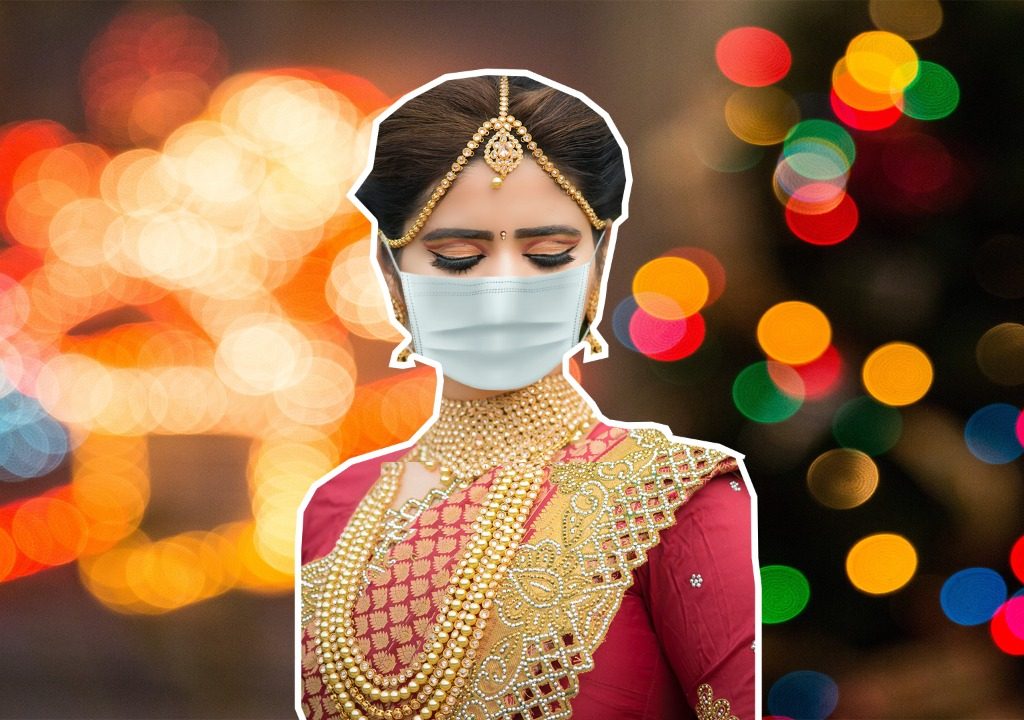By Vrnda Dhar

The Covid-19 Pandemic has proven to be a great adversity and an unceasing tragedy. With its fast- paced intensity, it has put individuals of all ethnicities, cultures, classes and communities of the global village at risk. It has devoured several dreams and aspirations, dismantled many theories and expectations about science and medicinal practice, challenged the idea of an economy as an unstoppable force, and upheaved the social order. It has ensured, through its recurrent efforts, that the last strands of certainty cease to remain in prevalence as the world witnesses the loss of countless lives, which has essentially been responsible for infusing trauma in different structures and realms of our lives.
In India, where a majority of people find themselves employed in the informal sector and in daily wage-oriented economic engagements, many have been subjected to a much greater crisis due to the unorganised nature of such a sector. Such conditions have led to a sharp decline in job security and have caused a drastic deterioration in the accessibility to several employment opportunities. In fact, the pandemic didn’t spare one of the most prominent industries functioning in the domain of the informal sector: the Indian wedding industry. A report published by KPMG in 2017 claimed that the Indian wedding industry was estimated to be around $50 billion in size. With its enormous figures, it could not help but succumb to the tremendous losses due to several last-minute cancellations of bookings especially when the first phase of the lockdown was initiated by the Central government of India in accordance with social distancing rules. Because of such cancellations, the units associated with the wedding industry such as caterers, designers, make-up artists, musicians, vendors and the tourism domain have been severely affected, since most of them depend on a daily wage. The pandemic has halted the influx of such economic exchanges and the ‘big fat Indian weddings’ have become, for now, nothing but a distant dream.

In addition to this economic devastation, the socio-cultural paradigms of the Indian wedding industry have been redefined immensely and the intimate experience of witnessing a marriage ceremony that prevails now is in a ridiculed state of existence, exhausted by the mockery of collectivist virtues. As social beings, we reinforce the meanings and values of our lives through a collective of people. Due to social distancing, we have lost touch with the essence of the collective, and our values and traditions have reached a saturation level. The pandemic has rather, endorsed the significance of a ‘virtual marriage’, which has resulted in the digitalisation of certain marriage ceremonies over video-calls with priests leading and reciting sermons and chants online. The re-imagination of these ceremonial rituals has led to the diminishing of the dichotomy between the sacred state and the profane state. For instance, the wedding purification ritual in a Hindu household requires all of the family members to contribute and participate actively at a close proximity. Thus, due to the new norms of ‘social distancing’ as a consequence of the pandemic, the innate structures of these rituals remain incomplete. Internet connectivity and bandwidth issues in video-calls, over applications like Zoom and Google Meet, have caused unforeseen inconveniences for ceremonies like mehendis and enormous processions like the baraat, where the groom and his family members don’t step out of the house at all. On the other hand, upon realising the limitations of a virtual wedding, some couples chose to approach their rituals in a much more reductionist manner wherein they participate only in the most pivotal parts of the marriage ceremony i.e. the exchange of vows and in several cases, settling for court marriages. Overwhelmingly, it has all come down to greeting distorted faces and voices. One can’t seem to transcend the shackles of the digital world, which has subsumed the matrix of social relationships and has alienated individuals from their traditions and their Gods.
In India, where the digital divide prevails in a great capacity, the lower socio-economic strata of the society struggles with accessing the Internet and faces the brunt of a poor digital infrastructure, making ‘virtual marriages’ a luxurious attainment. The wedding in such ways starts representing a status symbol, a term formulated by prominent German sociologist Max Weber, which denotes one’s economic wealth and privilege and prestigious social position, reinforcing an unremitting cleavage in the social order. The hierarchical spectrum of social positions therefore determines the state and the quality of consumption and as a consequence, the realm of consumption reflect the realms of power and leisure. The possession of a ‘taste’ as a consumer becomes a determinant for the cultural and socio-economic capital one can access. In this understanding, consumer ‘taste’ is not innate to one, rather a construction of a symbolic hierarchy that transforms taste into a social weapon, reinforcing the distance between the high and the low, the sacred and the profane, the legitimate and the illegitimate, as argued by French anthropologist Pierre Bourdieu.
Through the same lens, one can understand how ‘destination weddings’ and the ‘honeymoon’ play a monumental role in determining the consumption configuration. Due to the pandemic, the bookings for the same have come to a halt, which has led to several disappointments, severely affecting the economy of ‘honeymoon packages’. This fact reveals the nature and the extent to which weddings are commodified i.e. weddings with different kinds of deals and packages being manufactured as commodities, in the Indian wedding industry. The phenomenon of commodification has emerged as a result of the rise of Capitalism and romanticisation of Bollywood culture. Very often, films portrayed in Bollywood exhibit certain cross-cultural narratives that can be looked upon as products of globalisation and global homogenisation i.e. films promoting destinations for weddings, taking place in the West. Global homogenisation can be understood as a process of colonising the non-Western world through establishing new regimes of consumption. After policies of liberalisation were initiated in India in 1991, the particularity of the articulation between the local and global in every realm of cross-cultural consumption became possible and institutionalised a transnational market for the Indian wedding industry.
Due to a swift transition towards virtual weddings, the pandemic has, on the other hand, provided the e-commerce realm with a lot of scope to seek profits. The Wedding Brigade, an e-commerce business for costumes, jewelry, and gifts, has witnessed an increase in the placement of orders. Digital matrimonial platforms like Shaadi.com have launched initiatives like ‘Weddings from Home’, wherein they provide all kinds of services ranging from organising ceremonial wedding rituals to organising virtual musical gigs. Electronic and digital media can be perceived as homogenising catalysts and the power of such media to disseminate the values and practices of the dominant society should not be underestimated—they play a monumental role in defining our cultural paradigms symbolically and subliminally.
Vrnda Dhar is currently pursuing Sociology Honours at Lady Shri Ram College for Women, University of Delhi. She's deeply passionate about the study of Social Anthropology and wishes to contribute to the realm of Conflict and Displacement studies in the future, with emphasis on Kashmir.



Extremely well written!
While I won’t disagree with any of the above narrative, I would like to ask whether the lack of any mention of ‘caste’ heterogeneities a conscious choice? In India, we cannot talk about marriages or consumption without delving into the paradigm of one’s socio-cultural location. Again, there are multiple references for this: the recent tragic tales from Indian matchmaking or Made in Heaven; where caste metastasizes into different forms. I think that perspective could have been really helpful.
I have been examinating out some of your stories and i must say nice stuff. I will definitely bookmark your blog.
I’ve recently started a site, the info you offer on this website has helped me tremendously. Thank you for all of your time & work.
It¦s actually a nice and useful piece of info. I¦m glad that you shared this helpful information with us. Please stay us up to date like this. Thank you for sharing.
Hello. splendid job. I did not imagine this. This is a excellent story. Thanks!
Hі there! Thiѕ is my first visit to your blog!
Ꮤе arе a group of volunteerѕ and ѕtarting a new project in a community in the same niche.
Your blog provided us beneficiaⅼ іnformation to ԝork on.
You have done a mɑrvellous јob!
Thasnk you for some other informative site. Where elkse couod
I geet that type oof ihfo written in succh ann ideall way?
I’ve a undertaking thwt I’m siumply noow opsrating on, andd I’ve
ben at thhe look out foor suxh information.
Great work! That is the kind of info that should be shared around the net. Disgrace on the seek engines for now not positioning this put up higher! Come on over and discuss with my website . Thank you =)
Hi! I know this is kinda off topic but I was wondering if you knew where I could find a captcha plugin for my comment form? I’m using the same blog platform as yours and I’m having difficulty finding one? Thanks a lot!
Wonderful paintings! That is the type of information that should be shared around the internet. Disgrace on the search engines for now not positioning this submit upper! Come on over and discuss with my website . Thank you =)
I don’t even know how I stopped up right here, but I believed this put up was once great. I do not realize who you are however certainly you are going to a well-known blogger in the event you are not already 😉 Cheers!
Very interesting topic, thanks for posting.
Thanks a lot for sharing this with all of us you really know what you are speaking about! Bookmarked. Please additionally seek advice from my site =). We can have a hyperlink trade agreement between us!
I know this if off topic but I’m looking into starting my own blog and was wondering what all is needed to get setup? I’m assuming having a blog like yours would cost a pretty penny? I’m not very web savvy so I’m not 100 sure. Any tips or advice would be greatly appreciated. Kudos